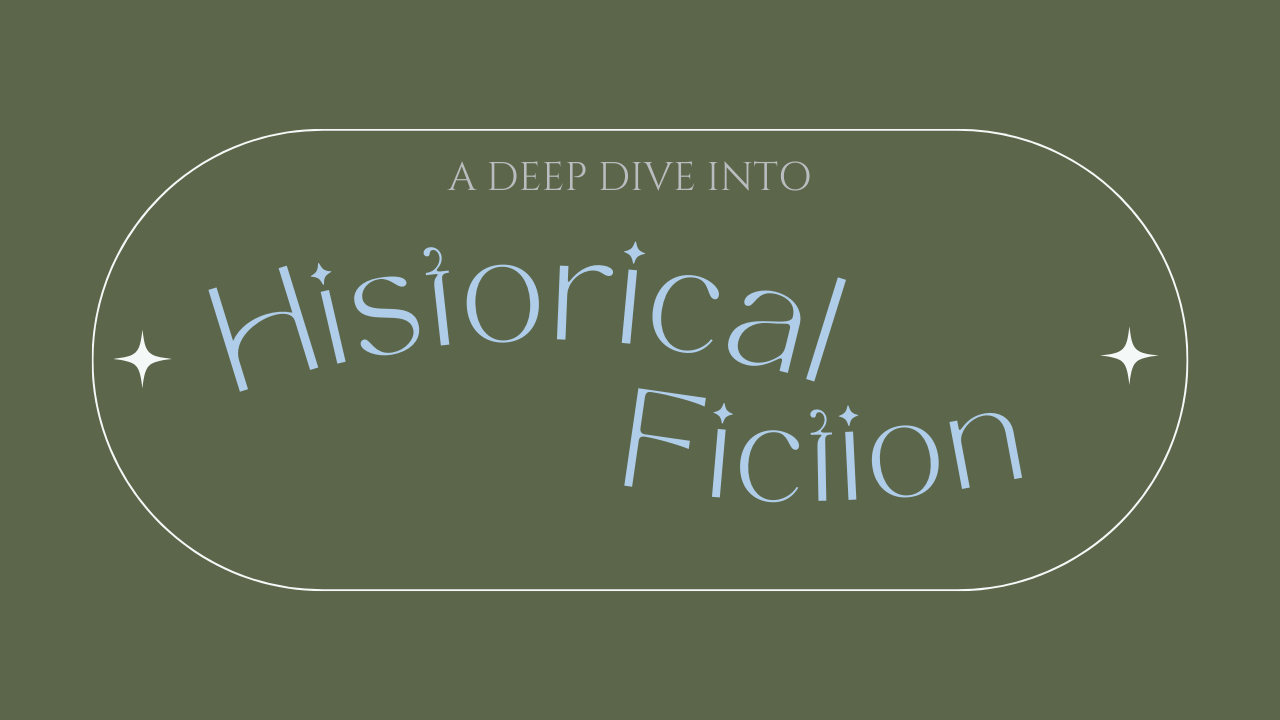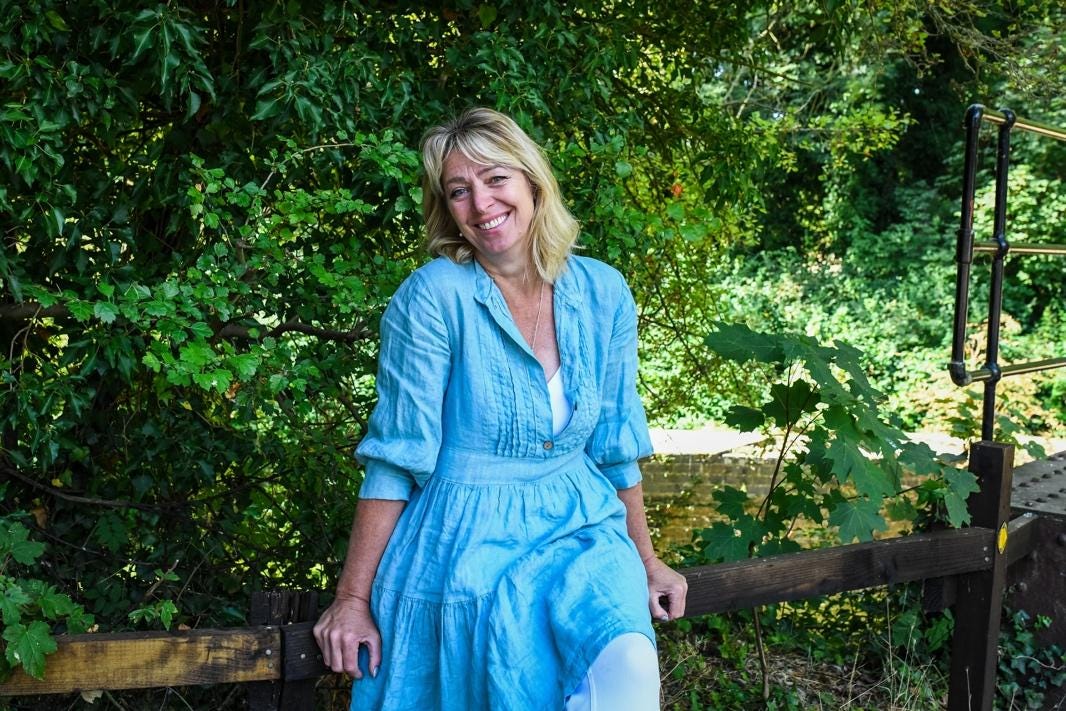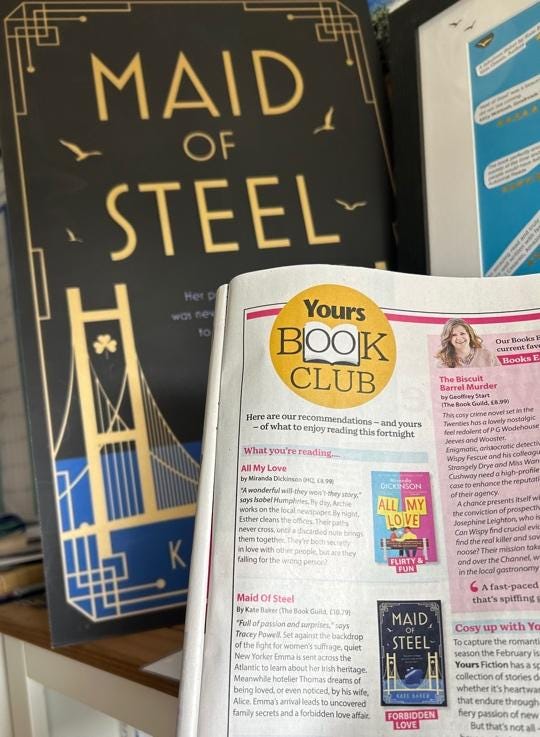Indie publishing for historical fiction writers
A deep dive into historical fiction | Article 3 of 7
Are you an aspiring writer who has a concrete goal to (one day, eventually!) ‘get published’?
Do you have experience in the world of traditional publishing but have become jaded with the industry that appears to promise wealth and success - yet seemingly only for a tiny, tiny minority?
Perhaps, like me, you’re dipping your toe into the water of writing for a broader audience and are intrigued by the possibility of having your book out there on physical or virtual book shelves…
If you are any of these people - and even if you’re not - welcome here!
I’m Holly, if we haven’t met before, and I write about all things medieval history/archaeology and historical fiction. I am passionate about writing creative stories that engage a range of audiences in discussions of the past that overcome cultural stereotypes, which means that I seek out subjects and characters that aren’t what usually make it into the history books. If that sounds like you, do make sure to join our community of readers and writers, where we connect regularly over books, biographies, historical discussions, and Q&A/ask-me-anything chats.
This is the third post in my current series taking a deep dive into the world of historical fiction.
Specifically, why we write/read it, how to get published in it, and what we think are the best examples out there, on and off Substack.
You can read previous posts in this series at the link below.
Over the next few weeks, I’ll be sharing guest articles written by individuals on Substack with a wealth of experience in the world of historical fiction publishing, who have very kindly agreed to share their thoughts on the theme of how to get published.
These articles will be shared each Saturday and Sunday until the end of November, a bumper posting schedule to showcase this wonderful genre that many of us call home.
Publishing with an indie publisher
Today’s article has kindly been put together by
, published author and writer here on Substack.Kate wrote terrible holiday diaries as a child, which her husband regularly asks her to read out loud for their entertainment. She has since improved and has written with intent since 2018. Her debut novel - Maid of Steel - was inspired by a weekend to Cork and specifically the Cobh Heritage Centre. She is writing her second novel, while enjoying seeing her short stories published in People’s Friend magazine this year. Kate lives near Ipswich in Suffolk, where they have an arable farm. They have a very small dachshund with a very loud bark.
I asked Kate a few questions about her experience publishing with an indie publisher, and here is what she had to say. Thank you Kate - and enjoy!
Describe your background in publishing historical fiction.
‘Maid of Steel’ was a one-sentence idea scribbled during a weekend in Southern Ireland during May 2019. I’d been to the Cobh Heritage Centre - south of Cork in Southern Ireland - with a friend. That night in the Airbnb, she opened a bottle of wine and I opened a notepad, convinced I could bring together the two aspects of the museum in one story; the mass exodus of people from Ireland over decades of potato famine and the departure of Titanic from the same port in 1912.
I spent four years working on the story, re-writing it twice and changing the beginning and ending numerous times, responding all the while to professional critique during either edits or 1-2-1s with agents. I’d been convinced I would only consider a traditional publishing deal and had prepared myself for a long wait and all the disappointments the submission process brings with it (unless you’re very fortunate).
What I never stopped loving was the premise, the characters I’d created and the journey they each took across the 72k words. What I did stop loving as the rejections came in was the knowledge that those words would probably not reach the hands of readers for a very long time, if at all. It was perfectly possible that even if I secured an agent, it would likely be a future manuscript they would submit to editors, having persuade me to put this story in the metaphorical drawer.
My husband had always maintained I should self-publish and compared the process to the fact I’d run my own business for fourteen years. I knew there was more to it and quite frankly the idea of formatting, uploading, learning Amazon or FB ads was enough to turn me off the idea completely. But through online groups and word of mouth, I heard about Troubadour Publishing and their sister company, The Book Guild.
Why did you choose the publishing route you went down?
Not surprisingly, I assumed that Troubadour ‘self-publishing services’ and The Book Guild ‘Partnership Publishing’ must be similar to vanity publishers because you paid them to do things. And vanity publishing was something I wouldn’t touch with the proverbial bargepole.
However, being a person who likes to find things out for myself while keeping in mind well-meant advice from others, I bought a ticket to Troubadour’s One Day Conference in Leicester in April 2022 and went along with my very large magnifying glass to hunt out all the clues. During chats with friendly staff (as I handled their authors’ paperbacks, sniffed the pages and admired foil lettering) I grilled them as to what made them not a vanity publisher. They happily explained - probably having done so many many times - that a vanity publisher will take all your Rights. TBG take only book Rights, leaving you with audio, TV and film lending etc and then only for 12 months after which they revert to the author, unless you choose to continue with them for another 12 months, at no extra cost. And secondly, a vanity publisher will charge horrendous amounts of money and rarely be open about what that money is being used for.
With The Book Guild model, the author submits their manuscript much like you/your agent would to a traditional publisher. If they see ‘commercial viability’ they will offer a partnership deal, anything up to 100%. I had nothing to lose by submitting Maid of Steel to them. So I did. A month later, I was offered a partnership publishing contract.
I’ll be open with you; they offered to me a 60/40 deal. Which means they paid 60% of the production costs and I paid 40 - which was approx £1600. That included the cover design (have you seen the cover?!) an edit, all the formatting and uploading, ISBN and registering with the British Library and all the legal stuff, PLUS six weeks of marketing on the run up to publication date. Before anyone tells me I could have done all that myself for free, believe me when I assure you I couldn’t. For one, I’m the world’s worst tech person but more importantly, I work full time running my own sole-trader business, plus I run our farm accounts and emails and simply didn’t have time to scratch even the surface of being a purely self-published author.
Anyway, I rather liked the 40% royalties proposition, paid twice a year, and knowing I’d receive a box of 30 author copies of the paperback - the quality of which was far superior to the Print on Demand books I’d handled - was also quite appealing as I liked the idea of author events.
I was more than happy to invest in my hobby, as one might do a monthly gym membership or a cyclist might purchase a bike weighing less than a can of baked beans and all the lycra to rival Bradley Wiggins, or a budding orchestral member might partake in months and months of piano lessons. You get my drift. A hobby - which my writing is right now - usually carries a financial cost. I rarely go on holiday because our farming calendar refuses to throw up empty weeks, so my ‘spare’ time is spent writing. I concluded that I could afford to assist the production of my debut novel, and was happy not to see those pennies come back and - like the gym bunny who swaps the membership for a better physique - enjoy instead what I was swapping the money for. In my case, seeing a paperback in my hands and being able to market it as I chose thereafter.
What, if anything, would you do differently if you had the chance to start again?
Absolutely nothing. Because I’m enjoying being the writer I am today and wouldn’t be that writer if I hadn’t followed this route. My debut has been out since February 2023, has sold over a thousand copies across ebook and paperback and I’m in talks with a narrator I met at the London Book Fair in April about having an audiobook made too. I have the option to forward the recorded files from the narrator to TBG who would do the technical uploading for a fee, or to one of the many audiobook specialists, who would also charge a fee to any indie author.
The marketing team helped secure articles in three newspapers, two magazines, three radio interviews, and they invited me to be one of their Author Ambassadors.
The cover, the quality and the logo on the spine (and maybe the words inside) all helped to secure a 14-day window display in Ipswich Waterstones after Rob Watson, the Manager, asked me to leave a copy with him. I’d walked in, prepared to donate a copy in the hope he might wish to help a local author, even though the setting wasn’t. He emailed ten days later to offer me the window display and a signing on publication day. We sold 32 copies through the til and he was thrilled and I was blown away that my little tale had been in the window alongside Harry’s SPARE!
What advice would you give to someone looking to publish along the same path you took?
Do your own research. No-one knows you and your aspirations like you do. While listening to other authors can be inspiring, their path to publication may not be the best route for you or your novel. One author’s experience is not only due to the pathway they chose, but the blueprints they bring to that experience.
For example, for a few years I’d stood shoulder to shoulder with other aspiring authors in writing groups, all hoping to secure a traditional deal. But then I made the decision to go with TBG and I know some of my contemporaries were surprised, and some even disappointed, saying things like, ‘I’m sure if you just wait a bit longer, you’ll get an agent,’ which revealed more about their opinion than my own!
But after much thought and research, I knew going indie was the right decision for me with that book at that time. And the reason for my shift in focus was easy to pinpoint. After spending two years in self-esteem counselling, the draw to see the book in the hands of readers became more powerful than being able to say ‘I’ve got an agent’. Two years on and my confidence has grown in that there have been numerous messages from readers across the world who owe me nothing and don’t know me from Eve, yet reached out to tell me they enjoyed my book and when would I be writing the next.
However, if you would rather hold out for the agent and then a publishing house editor, then you should very much stick to that path. We know patience is a virtue in the world of publishing. We know things are changing weekly and editors move between publishing houses and nothing stays the same. Opportunities are rolling in ALL the time. New agents are eager to build lists and might give us a go when more experienced agents simply don’t need to take that gamble. And publishing houses have ‘open submission days’ where an author can submit a manuscript even if they don’t have an agent. They know they have to compete with a fast-moving indie world, so their models are shifting and changing all the time. While I know I can repeat this route for Book 2, I may surprise myself and choose a different path this time. I’d be keen to see if I could secure a digital-first publisher, for example. But that’s the fun of this - anything’s possible, right?
What would be your top 3 tips for anyone writing historical fiction?
Don’t overuse your research in order to show how much knowledge you accrued while gathering facts. Sprinkle in relevant details only in scenes where the characters present an opportunity for a description of something, for example: She rushed out the door to find the snow had begun to lay, then turned around to fetch her *insert word here for a piece of clothing you were itching to describe as once worn then*)
Remember that characters set in worlds fifty, a hundred or five hundred years ago, had the same emotions as we do now. While dialect may have changed, their feelings and reactions will pretty much be the same. So that neanderthal character who has come face to face with a charging warthog? You can easily put yourself into his leather slippers if you recall the terrifying moment you stepped out in front of that London bus last year.
I was asked by one agent if I could re-write ‘Maid of Steel’ and set it in WWII because those books were selling. But I couldn’t really, because Titanic makes a cameo appearance towards the end of the novel, so this was another big reason I went indie. My story was linked to a piece of history (because of where I’d been when the idea had come to me) and I wanted Emma’s journey across the pages to remain rooted in 1911 and 1912. If you are passionate about the theme in your story, then know that there will be readers out there who will feel that same passion when they read your words. So, immerse yourself the world you want to create and enjoy the writing above all else. You have talent and ambition and your future titles could change someone’s life for the better.
Where can we find you, on and off Substack?
‘Maid of Steel’ can be found as an ebook on Amazon: https://amzn.eu/d/aPtbF6D
Or a paperback can be ordered from any High Street retailer, or direct from The Book Guild publishers at: https://www.bookguild.co.uk/bookshop/maid-of-steel/
Or I can sign a copy and post it out if you contact me direct at: hello@katefrancesbaker.com
I write on Substack as: katebakertellsastory.substack.com
I post on Instagram as: https://www.instagram.com/katefranceswrites/profilecard/?igsh=Znd2eW1iZjlwcDkw (KateFrancesWrites)
I occasionally appear on X as: @katefbaker
I sometimes dabble on FB as: https://www.facebook.com/KateBakerAuthor
Do you have experience publishing with an indie publisher or another publishing route?
Feel free to continue the conversation in the comments! I’d love to hear from you.
Did you know I’ve written a book of short historical fiction stories?
It’s included in the paid membership at Telling Their Tales, or you can buy it HERE.



















The great takeaway from this is that you seemed sure that if you immersed yourself in the world you wanted to write about by jumping into that world through your characters, that there would be readers for your book. Plus maybe a publisher that would believe in your writing to the point of setting forth a partnership publishing deal. I don't know if they have publishers like that in the U.S. but from your experience, it might be that finding such a publisher might be a good option worth taking. Thanks for letting everyone know of a Plan B that may not be the usual but still could be a very practical solution for how to publish one's first book.